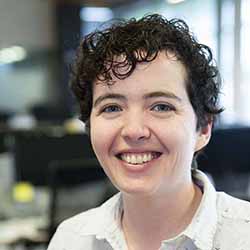Women in Mathematics Day 2021Speakers & abstracts
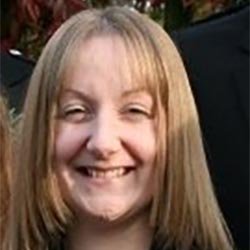
Professor Claire Miller, University of Glasgow
Data fusion for environmental applications
The surface water quality for lakes and rivers is routinely monitored to protect ecosystem, animal and human health and for compliance reporting to policymakers. Current monitoring strategies enable measurements of water quality determinands to be obtained through, for example, long-term monitoring programmes, automatic sensor monitoring data, drone data and data from processed satellite retrievals. Each individual data source can potentially be limited in the information available. When multiple sources of data are available for the same waterbody, the challenge lies in appropriately combining the available data streams where we potentially have large volumes of data in space and time, missing data, uncertainty in data retrievals and different spatial and temporal support across the data sources. This presentation will give examples of some recent and current statistical work in this area to develop suitable data fusion approaches with the aim of providing improved estimation of, for example, water quality and associated measures of uncertainty.
Claire Miller is Professor of Statistics and Head of Statistics at The University of Glasgow. Claire's first degree was in Mathematics and Statistics, followed by a PhD in Statistics at The University of Glasgow. Claire's current research interests are in developing statistical methodology to investigate global challenges predominantly arising in the area of environmental statistics, with methods including nonparametric modelling, functional data analysis, data fusion and multivariate methods for networks.
Claire is the secretary of The International Environmetrics Society TIES, an associate Editor for the Journal Environmetrics, an elected member of the International Statistical Institute, an elected member of the RSE Young Academy of Scotland (YAS), and an elected member of the Royal Statistical Society council.
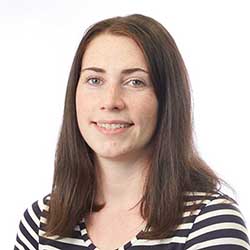
Dr Katherine Tant, University of Strathclyde
Mathematics for a Safer World
The oil and gas, nuclear and aerospace industries are just a subset of the sectors dependent on the routine maintenance of safety critical structures. To mitigate the risk of catastrophic failure, the structural integrity of key components within these industries must be assessed regularly. Ultrasonic non-destructive testing (UNDT) is a technique which involves the transmission of mechanical waves through a solid object. Just like in medical ultrasound, these waves can be passed through the object and subsequently recorded without disturbing its internal composition. Thus large networks of ultrasonic sensors are often deployed to carry out safety inspections, resulting in large quantities of noisy data for which mathematical algorithms are required to decipher. In the first part of this talk, I will describe some of the challenging mathematical problems associated with looking inside solid objects and discuss the advantages of working at the interface between industry and academia. In the second part, I will talk about Homeward Bound, a global leadership initiative that I am participating in which aims to promote the role of women in the STEMM disciplines.
Dr Katy Tant graduated with a 1st class BSc (Hons) in Mathematics from Heriot-Watt University in 2011 before completing her PhD in applied mathematics at Strathclyde in 2014. She is currently an EPSRC UKRI Innovation Fellow and Chancellor's Fellow working in the Department of Mathematics and Statistics at Strathclyde. Katy is passionate about the integration of mathematics with industry, her commitment to which is demonstrated by her editorial role on the book "UK Success Stories in Industrial Mathematics" which showcased mathematical research within the UK that has resulted in international industrial impact. She has also recently been selected to participate in the Homeward Bound programme, a global initiative which aims to promote female leadership in STEMM disciplines and which culminates in an Antarctic voyage in November 2020.
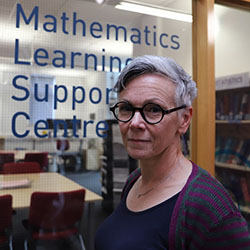
Dr Paola Iannone, University of Loughborough
Learning about proof with LEAN
Much of the mathematics education literature concerned with the university level is dedicated to investigate the difficulties that first year undergraduate students have with proof. Proof is one of the first stumbling blocks students encounter when they join a mathematics degree and one that needs to be overcome in order to become 'good' mathematics students and fully fledged members of the mathematics community. Among these difficulties there are the problematic use of formal language, the difficulties with the rigour of proof or with the logical structure of proof and the lack of identification of main mathematical objects involved in the proof and their properties. The difficulties that students have with engaging with proof in their first year are so widespread that several teaching interventions have tried to alleviate them, including the use of programming software in pure mathematics modules. In this talk I will present findings from a project that investigated the impact of the engagement with the automated theorem prover LEAN (https://leanprover.github.io) on students’ proof writing and proof production when used in a first year transition to proof module.
Dr Paola Iannone completed a first degree in mathematics at the University La Sapienza (Rome - Italy) and a PhD in Pure Mathematics at the University of East Anglia (UEA). She then was appointed for three years as a Teaching Fellow in the Mathematics department at UEA, and later became a Senior Research Assistant in the School of Education still at UEA until she was appointed to a Lectureship in Educational Research in 2007 and then to a Senior Lectureship in 2012. She took up her current post as a Senior Lecturer in Mathematics Education at Loughborough University in 2016. Paola’s research focuses on the teaching and learning of mathematics at university level and has two strands: the impact of summative assessment of mathematics at university on students’ approaches to learning; and mathematical reasoning, with focus on proof and proof production and the use of examples in mathematics learning.
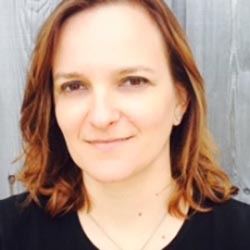
Dr Laura Ciobanu, Heriot-Watt University
Solving equations in groups (but not teams)
For a group or semigroup or ring G, solving equations where the coefficients are elements in G and the solutions take values in G can be seen as akin to solving systems of linear equations in linear algebra, Diophantine equations in number theory, or more generally polynomial systems in algebraic geometry.
I will give a short survey containing results from both mathematics and computer science about solving equations in infinite nonabelian (semi)groups, with emphasis on the free ones. In particular, I will explain that the solutions to equations can be beautifully described in terms of formal languages, and that the latest techniques involving string compression produce optimal space complexity algorithms.
Laura Ciobanu got her PhD in group theory from Rutgers University (USA) in 2005. She was then a postdoc in Barcelona at the CRM and at the University of Auckland, New Zealand. Between 2007 and 2016 she was at the Universities of Fribourg and Neuchatel in Switzerland, first as a lecturer and then as a Swiss National Science Professor. Laura joined Heriot-Watt University in Edinburgh in 2016, where she is now Associate Professor. For more information visit her webpage http://www.macs.hw.ac.uk/~lc45/ .
Dr Jill Miscandlon, University of Strathclyde
From Mathematics to Manufacturing
Manufacturing challenges lie all around, from the drive for zero carbon transport to the development of AI assisted instruments to aid the aging population. The technical difficulties within each challenge are immense and for them to be overcome in a timely manner, engineering research requires the input of scientists, especially mathematicians. Mathematical training allows you to approach any problem- regardless of context- and develop a logical and successful solution. In my talk, I will give some examples of the challenges within engineering today, especially focused on the need for electric propulsion solutions, and novel manufacturing techniques that will help us to achieve our goals.
Dr Jill Miscandlon graduated from the University of Strathclyde with a PhD in Mathematics and BSC (Hons) First Class in Mathematics. In 2013, Jill started working at the AFRC as a Research Assistant on hot forming technologies, such as superplastic forming. In 2014 she was promoted to a Research Associate working on cold, incremental forming processes, and lead the flow forming work stream of the large CR&D SAMULET (Strategic Affordable Manufacturing in the UK through Leading Environmental Technologies) project with Rolls-Royce. Her most recent promotion to Senior Manufacturing Engineer in 2017 seen Jill take a lead in the more strategic implementation of advanced forming technologies in various applications, including future electrical propulsion solutions. Jill is currently the lead researcher at Strathclyde for the £10.8 million EPSRC funded Future Electrical Machines Manufacturing (FEMM) hub.
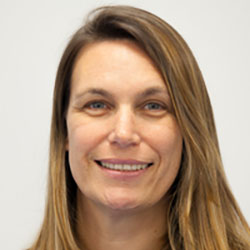
Dr Tiffany Wood, University of Edinburgh
Underpinning innovation with mathematics
Physics is the application of mathematical equations describing forces and energy and is a guiding tool that helps her, and her colleagues, understand how the microstructure of mixed ingredients is formed, how it changes and how it flows. Most commonly she works with companies who manufacture every-day consumer products, e.g. over-the-counter medicines, decorative paints and foods to help them improve manufacturing efficiencies and product stability. During this talk she will talk about the benefits of bringing together diversity of thought and how her background in liquid crystal and colloid physics combined with formulation science has led to a new invention that could create better consumer products.
Dr Tiffany Wood is a soft matter physicist who co-founded the Edinburgh Complex Fluids Partnership in 2012 to enable knowledge transfer between academic research and companies in the life and chemical sciences. From her Royal Society Industry Fellowship with The Mentholatum Company Ltd, Dr Wood patented a new technology, DAINtech, that provides a new route for creating stable formulated products (such as personal care products, inks or decorative paints) using sustainable, biodegradable materials. During the past year, Dr Wood and a colleague, Vincent Martinez, co-founded Dyneval, a company that uses advanced image analysis methods, based on statistical physics, to provide reliable measurements of semen quality using portable equipment. Currently, Dyneval is focussed on helping the cattle reproduction industry raise conception rates to improve food security and reduce greenhouse gas emissions. During my talk, I will reveal how mathematical methods (under the guise of physics!) have been central to our ability to drive innovation to support existing companies and create new technologies.
For more information see: http://www.drtiffanywood.com/
